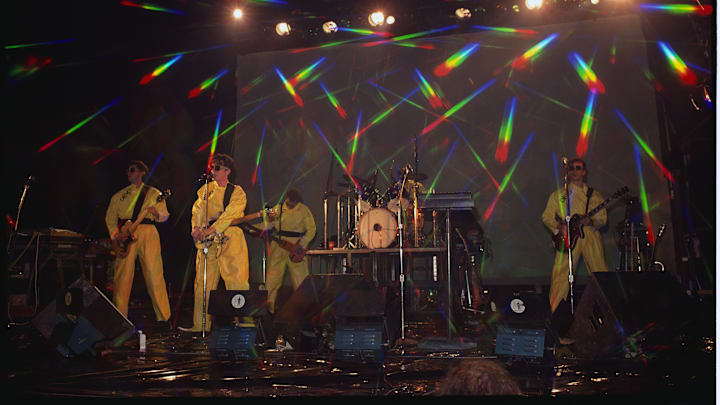Very often, even the most reliable reference sources like Britannica have a somewhat restricted definition of conceptual art, defining it as "artwork whose medium is an (or a concept), usually manipulated by the tools of language and sometimes documented by photography.
Its concerns are idea-based rather than formal." This a bit restrictive definition doesn’t include the conceptual ideas presented through music, rock included.
Of course, there were quite a few rock bands that included conceptual art ideas in their music. Very few (if any) have done it as good, and have been practically misunderstood like Akron, Ohio’s Devo, and the new Netflix documentary by director Chris Smith (Jim & Andy: The Great Beyond, Fyre, and American Movie).
Why you should watch the Devo documentary on Netflix
Simply titled Devo, tells their story in all the right ways. Now, there is a plethora of rock documentaries out there these days; some don't cut the mustard, others are a must-watch, and this is one of them.
Essentially, what is so misunderstood about this band? Well, let’s start with so many categorizing them just as a new wave band, possibly because they gained prominence at the turn of the seventies into the 1980s when new wave was such a big thing. Sure, Devo can partly fall within that genre, but they were much more than that.
As the renowned film critic Matt Zoller Seitz notes in his review of this documentary, “Devo combined electronica, new wave, punk, performance art, multimedia experimentation, filmmaking, and politics. They were semiotic terrorists with revolutionary rhetoric, a killer backbeat, and hooks that stuck in your brain."
And yes, they were all that. Director Smith, through a seriously researched clips and conversations with band members, particularly two main instigators (Mark Mothersbaugh and Gerald “Gerry” Casale), goes deep into the roots of the band.
Starting with its inception in the aftermath of the 1970 Kent State tragedy, the introduction of the de-evolution idea, bringing the Dadaism art movement into rock, and the band getting actual hits (particularly “Whip It”) for all the right (and wrong) reasons. Their haggling with record companies, and the band sticking to their conceptual guns through thick and thin.
Yet, throughout the band’s operation, it seems that very few understood what Devo were trying to present through their music (M. Mothersbaugh now does film soundtracks) and the visuals (G. Casale makes music and ad commercial videos) that accompanied it, with most of the audiences, and particularly their record companies, taking it only at face value.
The thing is, so many things Devo tried to say through their concept were not only true at the time they were created but in retrospect seem quite prophetic when we look at how things stand today, something this documentary presents in quite a clear way.
It is quite a captivating watch, making all the fans (and those that might not be) pull out those dusty Devo records (or brand spanking new streams) and listen a bit more carefully.
